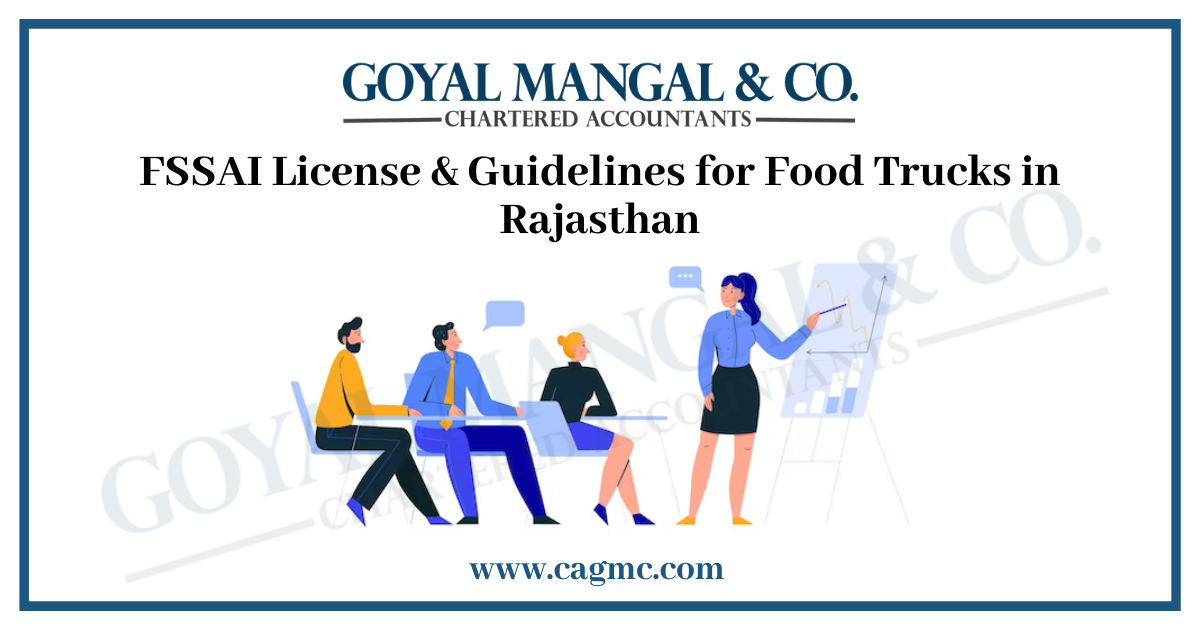
In recent years, food trucks have gained immense popularity, providing a unique and convenient dining experience for people o the go. In the vibrant state of Rajasthan, these mobile culinary ventures are becoming prevalent, serving up a diverse array of delectable dishes. However, with great flavours come great responsibilities. To make sure the safety and hygiene of the food being served, food truck operators in Rajasthan must adhere to the guidelines set forth by the Food Safety and Standards Authority of India (FSSAI). In this article, we will delve into the FSSAI license & Guidelines for Food Trucks in Rajasthan. By understanding these regulations, food truck owners can not only protect the health of their customers but also foster trust and confidence in their culinary offerings.
|
Table of Content |
Meaning of Food trucks under FSSAI
Under the FSSAI, food trucks are considered “Food Service Operators” and fall under the purview of the food safety regulations enforced by FSSAI. Food trucks are mobile food establishments that operate from a vehicle and serve ready-to-eat food to customers. As they move from one location to another, they are subject to specific regulations to ensure that the food they serve is safe and meets the required standards.
FSSAI has established guidelines and regulations for food trucks to maintain hygiene, handle food safely, and prevent foodborne illnesses. Food truck operators must obtain the appropriate FSSAI license based on the scale of their operations, such as basic FSSAI registration or state/central FSSAI license, depending on their annual turnover. These licenses signify that the food truck operator has met the requirements and complies with the food safety standards set by FSSAI.
Process for obtaining FSSAI License for Food Trucks under FSSAI in Rajasthan
The process for obtaining an FSSAI license for food trucks in Rajasthan involves several steps. Here is a general overview of the process:
- Determine the License Category: Based on the scale of your food truck operations, determine whether you fall under the category of a basic FSSAI registration or a state/central FSSAI license. This depends on your annual turnover.
- Gather Required Documents:
- Identity Proof: Collect valid identity proof documents, such as Aadhaar Card, Voter ID, PAN Card, etc.
- Address Proof: Gather address proof documents, such as Aadhaar Card, Voter ID, utility bills, rent agreement, etc.
- Food Truck Ownership/Rental Agreement: Obtain proof of ownership or rental agreement for the food truck.
- Blueprint/Layout of Food Truck: Prepare a blueprint or layout plan of the food truck, indicating the different areas such as cooking, storage, and serving sections.
- Fill out the FSSAI Application Form:
- Visit the FSSAI website and access the online portal for license applications.
- Fill out the application form with accurate and detailed information, including personal details, business details, and food truck specifications.
- Provide the necessary supporting documents as mentioned in the application form.
- Submit the Application and Pay Fees:
- Review the application form and attached documents for accuracy and completeness.
- Pay the prescribed fees for the FSSAI license. The fee may vary depending on the license category and the duration of the license.
- Application Verification and Processing:
- After applying, the FSSAI authorities will verify the information and documents provided.
- The application may undergo a thorough inspection process to ensure compliance with food safety and hygiene standards.
- License Issuance:
- Once the verification process is complete, and the food truck and the applicant are found to be compliant with the requirements, the FSSAI license will be issued.
- The license will be sent to the registered email address or can be downloaded from the FSSAI portal.
FSSAI Guidelines for Food Trucks in Rajasthan
Here are FSSAI’s general guidelines for food trucks in Rajasthan are:
- Hygiene and Sanitation:
- Food Handlers: Ensure that all food handlers have valid health certificates and follow proper hygiene practices, including wearing clean uniforms, using gloves, and maintaining personal cleanliness.
- Food Storage: Store food items properly to maintain their freshness and prevent contamination. Maintain proper temperature controls for perishable items.
- Utensils and Equipment: Ensure that all utensils, cooking equipment, and food preparation surfaces are clean and regularly sanitized.
- Waste Disposal: Follow proper waste disposal practices and maintain cleanliness in and around the food truck.
- Water and Sanitation: Maintain a clean and adequate supply of potable water for food preparation and handwashing. Install handwashing facilities in the food truck.
- Food Handling and Safety:
- Ingredient Quality: Ensure that the ingredients used in food preparation meet quality standards and are sourced from approved suppliers.
- Cross-Contamination Prevention: Take measures to prevent cross-contamination between raw and cooked foods, such as using separate cutting boards and utensils.
- Allergen Management: Clearly label allergenic ingredients and inform customers about potential allergens in the food being served.
- Food Packaging and Labelling: Properly package and label food items with essential information such as name, ingredients, date of manufacture, and best before/use-by date.
- Record-Keeping:
- Maintain records of food sources, ingredients, and suppliers for inspection purposes.
- Keep a record of daily sales and transactions, including details of the food items sold and their quantities.
- Display of License: Display your FSSAI license prominently within the food truck for inspection purposes. This helps establish transparency and trust with customers and regulatory authorities.
Commercial Impact of FSSAI License for Food Trucks in Rajasthan
The FSSAI license for food trucks in Rajasthan has a significant commercial impact on the operations and reputation of these mobile culinary ventures. Here are some key commercial impacts:
- Legitimacy and Trust: Obtaining an FSSAI license showcases the legitimacy and compliance of a food truck operator with food safety standards. It instils trust among customers, assuring them that the food being served is prepared and handled safely and hygienically. This can attract more customers and build a loyal customer base.
- Enhanced Market Access: Many event organizers, festivals, and venues require food vendors, including food trucks, to possess a valid FSSAI license. Having the license expands the market opportunities for food truck operators as they can participate in various events and locations that prioritize food safety and regulatory compliance.
- Compliance with Legal Requirements: Operating a food truck without the necessary FSSAI license can result in legal implications, including penalties, fines, or closure. By obtaining the license, food truck operators comply with the legal requirements set by the FSSAI, ensuring a smooth and uninterrupted business operation.
- Competitive Advantage: In a crowded food truck industry, having an FSSAI license sets a food truck apart from unlicensed competitors. It demonstrates a commitment to food safety and hygiene, giving the licensed food truck a competitive edge. Customers are more likely to choose a licensed food truck over an unlicensed one due to their trust in regulatory compliance.
- Customer Perception and Reputation: Food safety and hygiene have become significant concerns for consumers. Having an FSSAI license conveys a strong message that the food truck prioritizes these aspects, leading to a positive customer perception and an enhanced reputation in the market. Satisfied customers are more likely to recommend and revisit a licensed food truck, driving repeat business.
Takeaway
By acquiring an FSSAI license, food truck operators gain legitimacy and trust, attracting more customers and building a loyal following. The license opens doors to various market opportunities. Like participating in events and venues that prioritize food safety. Compliance with legal requirements also safeguards against penalties and closures, ensuring uninterrupted business operations. Furthermore, an FSSAI license provides a competitive advantage, distinguishing licensed food trucks from unlicensed competitors. It signifies a commitment to food safety, elevating customer perception and enhancing the truck’s reputation. Satisfied customers are more likely to recommend and revisit a licensed food truck, driving repeat business and fostering growth.







